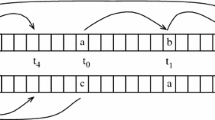Abstract
We study the basic problem of preemptive scheduling of a stream of jobs on a single processor. Consider an on-line stream of jobs, and let the ith job arrive at time r(i) and have processing time p(i). If C(i) is the completion time of job i, then the flow time of i is C(i) − r(i) and the stretch of i is the ratio of its flow time to its processing time; that is, \(\frac{{C(i) - r(i)}}{{p(i)}}\). Flow time measures the time that a job is in the system regardless of the service it requests; the stretch measure relies on the intuition that a job that requires a long service time must be prepared to wait longer than jobs that require small service times.
We present the improved algorithmic results for the average stretch metric in preemptive uniprocessor scheduling. Our first result is an off-line polynomial-time approximation scheme (PTAS) for average stretch scheduling. This improves upon the 2-approximation achieved by the on-line algorithm srpt that always schedules a job with the shortest remaining processing time. In a recent work, Chekuri and Khanna (Proc. 34th Ann. Symp. Theory Comput., 297–305, 2002) have presented approximation algorithms for weighted flow time, which is a more general metric than average stretch; their result also yields a PTAS for average stretch. Our second set of results considers the impact of incomplete knowledge of job sizes on the performance of on-line scheduling algorithms. We show that a constant-factor competitive ratio for average stretch is achievable even if the processing times (or remaining processing times) of jobs are known only to within a constant factor of accuracy.
Similar content being viewed by others
REFERENCES
Afrati, F., E. Bampis, C. Chekuri, D. Karger, C. Kenyon, I. Milis, M. Queyranne, M. Skutella, C. Stein, and M. Sviridenko, “Approximation schemes for scheduling to minimize average completion time with release dates,” in Proceedings of the 40th Annual IEEE Symposium on Foundations of Computer Science, October 1999, pp. 32–43.
Baker, K. R., Introduction to Sequencing and Scheduling, Wiley, New York, 1974.
Bast, H., “Dynamic scheduling with incomplete information,” in Proceedings of the 10th Annual ACM Symposium on Parallel Algorithms and Architectures, 1998, pp. 182–191.
Bast, H., “On scheduling parallel tasks at twilight,” Theory Comput. Syst, 33, 489–563 (2000).
Bender, M., S. Chakrabarti, and S. Muthukrishnan, “Flow and stretch metrics for scheduling continuous job streams,” in Proceedings of the 9th Annual ACM-SIAM Symposium on Discrete Algorithms, January 1998, pp. 270–279.
Bender, M., S. Muthukrishnan, and R. Rajaraman, “Improved algorithms for stretch scheduling,” in Proceedings of the 13th Annual ACM-SIAM Symposium on Discrete Algorithms, January 2002, pp. 762–771.
Chekuri, C. and S. Khanna, “Approximation schemes for preemptive weighted flow time,” in Proceedings of the 34th Annual ACM Symposium on Theory of Computing, 2002, pp. 297–305.
Chekuri, C., S. Khanna, and A. Zhu, “Algorithms for minimizing weighted flow time,” in Proceedings of the 33rd Annual ACM Symposium on Theory of Computing, 2001, pp. 84–93.
Goel, A., M. Henzinger, S. Plotkin, and E. Tardos, “Scheduling data transfers in a network and the set scheduling problem,” in Proceedings of the 31st Annual ACM Symposium on Theory of Computing, Atlanta, Georgia, May, 1999, pp. 189–197.
Harchol-Balter, M., M. Crovella, and C. Murta, “Task assignment in a distributed server,” J. Parallel and Distribut. Comput., 59, 204–228 (1999).
Kalyanasundaram B. and K. Pruhs, “Minimizing flow time nonclairvoyantly,” in Proceedings of the 38th IEEE Symposium on Foundations of Computer Science, 1997, pp. 345–352.
Kalyanasundaram, B., K. Pruhs, and M. Velauthapillai, “Scheduling broadcasts in wireless networks,” in Proceedings of the Annual European Symposium on Algorithms, 2000, pp. 290–301.
Leighton, T., January 2003. Personal communication.
Leonardi, S. and D. Raz, “Approximating total flow time on parallel machines,” in Proceedings of the 29th Annual ACM Symposium on Theory of Computing, May 1997, pp. 110–119.
Motwani, R., S. Phillips, and E. Torng, “Nonclairvoyant scheduling,” Theoreti. Comput. Sci., 130, 17–47 (1994).
Muthukrishnan, S. and R. Rajaraman, “An adversarial model for distributed dynamic load balancing,” J. Interconnect. Networks, 3; 35–47, (2002).
Muthukrishnan, S. R. Rajaraman, A. Shaheen, and J. Gehrke, “Scheduling to minimize average stretch,” in Proceedings of the 40th Annual IEEE Symposium on Foundations of Computer Science, October 1999, pp. 433–442.
Author information
Authors and Affiliations
Rights and permissions
About this article
Cite this article
Bender, M.A., Muthukrishnan, S. & Rajaraman, R. Approximation Algorithms for Average Stretch Scheduling. J Sched 7, 195–222 (2004). https://doi.org/10.1023/B:JOSH.0000019681.52701.8b
Issue Date:
DOI: https://doi.org/10.1023/B:JOSH.0000019681.52701.8b




